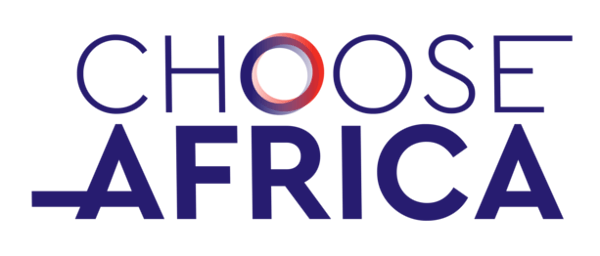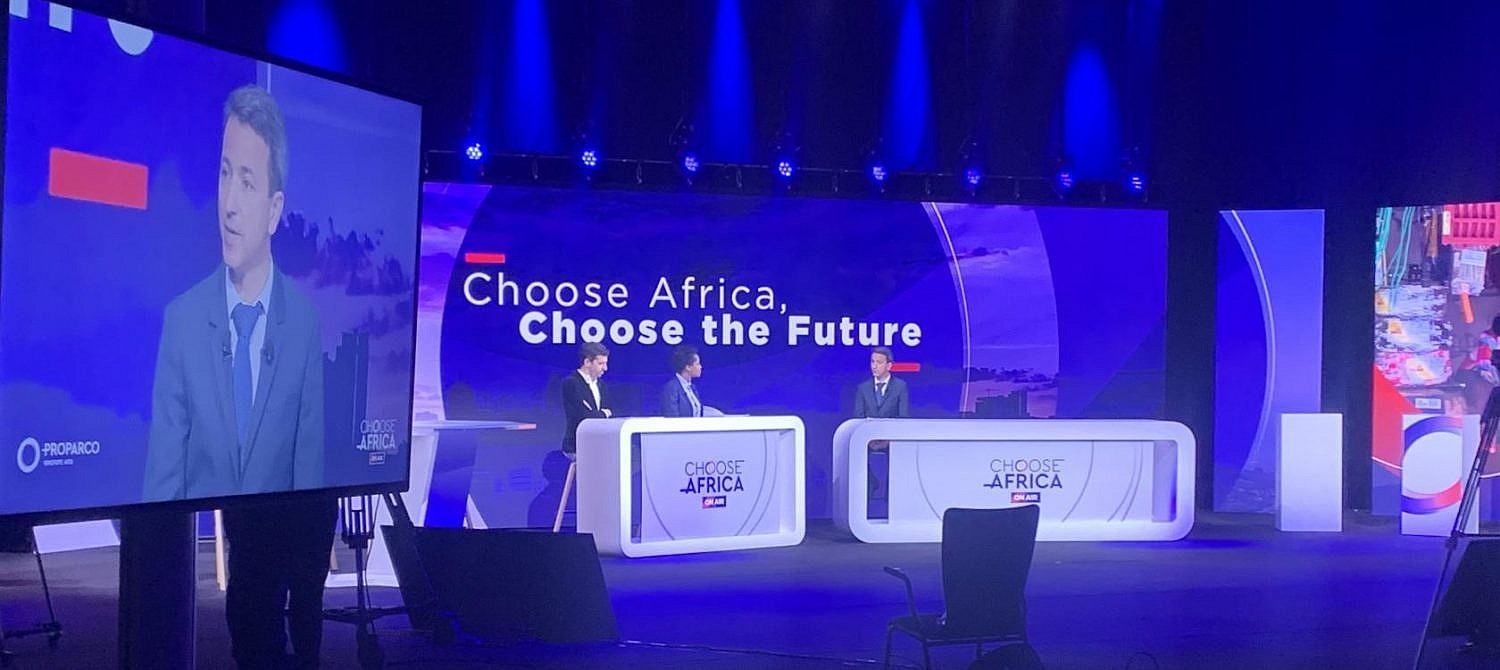CHOOSE AFRICA, CHOOSE THE FUTURE
It was against this backdrop and in order to review the progress of the initiative that Proparco webcasted “Choose Africa on Air” on 8 June. Grégory Clemente, CEO of Proparco, began by reminding participants that “Proparco’s role is to partner these entrepreneurs and business ventures, all of whom are helping to respond to the challenges facing the continent. We are working closely with dynamic Africa on issues like access to water, energy and essential services. Africa is busy innovating and launching new ventures and we need to support this momentum. Africa can make a fantastic contribution to a new global cycle of sustainable growth.”
This view was shared by economist Vera Songwe, United Nations Under-Secretary-General and Executive Secretary of the Economic Commission for Africa (ECA), who believes that the private sector can generate the jobs of the future, especially in emerging economies. She views “each African micro business and SME as a budding multinational”. However, at a time when the Covid-19 pandemic has already destroyed thousands of jobs, it is more urgent that ever “to help these businesses get access to credit”.
EXTRAORDINARY MEASURES FOR DEALING WITH AN EXTRAORDINARY CRISIS
James Mwangi, CEO of Equity Bank, a Panafrican financial services group with 15 million customers that partners some 2 million micro businesses and SMEs, agreed entirely both with this analysis and the urgency of the situation. He explained that “micro businesses and SMEs are the lifeblood of African enterprise and they play an active role in transforming the continent”, before highlighting the US$ 100 million loan provided by Proparco to Equity Bank in October 2020 at the peak of the pandemic. This loan was part of the Choose Africa initiative, which prioritises small businesses with job creation potential as well as projects that generate co-benefits for the climate. James Mwangi believes that this partnership will help free up more loans for African businesses: “it is important to liaise with development institutions to create measures that support micro-businesses and SMEs by providing them with guarantees and credit facilities.”
And this is exactly the purpose of the Resilience component of Choose Africa, comprising measures specifically designed to tackle the crisis. Xavier Echasseriau, Deputy Head, “Guarantees for Development” at Proparco’s Financial Institution & Inclusion division, went on to explain that the Choose Africa Resilience guarantee covers up to 80% of an emergency loan, repayable over periods of between one and five years. It also makes it easier for retail banks to provide their customers with additional financing, just as Société Générale Côte d’Ivoire has done. Aymeric Villebrun, Société Générale’s representative in Abidjan, recognised that “this product enables us to continue to fulfil our role of providing finance to Ivorian small businesses in the midst of a crisis”. This measure has directly benefited many different entrepreneurs, including Willy Raoul, who heads up the Ivorian SME, Art de vie, which was severely impacted by the pandemic. He readily admitted that “without the Choose Africa Resilience guarantee and the support of Société Générale, I would have gone out of business”. Fatoumata Sissoko-Sy, Proparco’s Regional Director for West Africa, stressed how these support measures enable Proparco “to continue its essential work of partnering impact entrepreneurs and promoting financial inclusion”.
THE PANDEMIC IS ACCELERATING DIGITALISATION IN AFRICA
Faced with the ongoing pandemic, many companies have had to review their business models, while others – especially start-ups that provide innovative solutions (e-commerce, Ed Tech, etc.) – have seized this unprecedented opportunity. Johann Choux, head of Venture Capital at Proparco, confirmed that “both in our own portfolio and in those of our partner investment funds, these innovative start-ups doubled their revenues in 2020”. The next people to speak were Eric Pignot in Cameroon, who heads up the Enko Education group which prepares students to pass entrance exams for the best African universities, Gregory Rokson, co-founder of m-Pharma in Ghana, and Omobola Johnson, the former Nigerian Minister for technologies and telecoms, and currently a senior partner with TLCom Capital investment fund. This digital acceleration of the African economy was also on show with the example of the Kenyan group poa! internet, which provides low income customers with high-speed, affordable and unlimited internet connections.
INVESTING IN ALL PHASES OF A PROJECT
Choose Africa partners all the potential of the African private sector and provides entrepreneurs with a wide range of financial solutions carefully tailored to their needs. The financing offer is adapted to all stages of a company’s development: pre-seed funding, venture capital, scaling-up and the expansion phase. We could describe it as a “one-stop shop” for investment financing. As Damien Braud, head of Proparco’s African Investment division pointed out, “we tailor our support to the size of the investment in question: from tens of thousands to tens of millions of euros”. This was exactly the type of “customised service” provided to Legacy Girls College in Ghana, supported by Oasis African Fund, one of Proparco’s partners. The Moroccan-based ODM group, specialised in medical diagnosis and oncology was another beneficiary as its CEO Mohamed Elmandjra explained: “in 2018, Proparco took a stake in ODM, providing us with financial support as well as access to its network and CSR expertise. We grew from a small structure of 45 employees and around a dozen doctors into a group of a dozen entities spread throughout six regions of Morocco, employing 500 health professionals, including 130 doctors”.
In addition, AFD Group provides CSR upskilling services (through learning and mentoring programmes for example) tailored to the African entrepreneurial ecosystem and including incubators. Sarah Marniesse who runs Campus AFD pointed out that “Africa is going to have to find jobs for 450 million young people by 2050 and this represents a massive challenge”. The Campus has set up several support programmes such as the Social and Inclusive Business Group (SIBC). She added that “CSR support is key to fostering resilience and understanding the world in which we live”.
SUPPORTING FEMALE ENTREPRENEURSHIP
Choose Africa is also fostering female enterprise at a time when African women entrepreneurs are struggling to get access to finance. And yet, 24% of African women are entrepreneurs (versus only 8% in Asia) and every year their businesses generate revenues of between US$150 billion and US$200 billion. “But less than 30% of these women have bank accounts and under 5% have access to credit facilities”, stressed Myriam Brigui, Director of Proparco’s International Network Department, who spoke in detail about AFD Group’s commitment to the 2X Challenge initiative in support of female entrepreneurship. Speaking live from Johannesburg, Siby Diabira, Proparco Regional Director for Southern Africa and the Indian Ocean, reiterated the crucial nature of this challenge as difficulties accessing credit affect all African women, including those in South Africa.
In Tunisia too the economic situation is tricky for micro-businesses. “Microcredit is giving some decision-making power back to women, a power they have been deprived of for centuries, according to Essma Ben Hamida, founder of the Tunisian NGO Enda which works to foster female entrepreneurship on the ground. In Senegal, a small business called Lysa & Co – run by a woman – has opted to employ only women in positions of responsibility while contributing to local economic development. Indeed, as Khadidiatou Nakoulima – founder of NEST, a small business specialised in the medical monitoring of mothers and small children – confirmed live from Dakar, the female enterprise culture is alive and well: “in large corporations and small businesses, more women are urgently needed on management bodies to provide equal opportunities for those who have proved their worth.”
FINANCING AS MANY BUSINESSES AS POSSIBLE
The webcast focused on the importance of an inclusive approach and continued with a section dedicated to the impact of Choose Africa on all African entrepreneurs regardless of what stage their project is at. However, as Laurence Bottin, a Senior Investment Officer with Proparco explained, the informal sector remains an essential component of Sub-Saharan African economies.
Only microfinance can really meet the needs of these frequently vulnerable customers, excluded from traditional banking services. A good example is AB Bank in Zambia, a partner to Choose Africa and the only bank in the country providing finance to micro-businesses with an average loan amount of US$ 900, as Rambert Namy, a director of AB Bank Zambia reiterated. Indeed, Kenneth Kapampa, Director of Ashton Pharmaceuticals, a small pharmaceuticals distributor confirmed this: “AB Bank took just a week to grant us a first loan of €7,700 that we were able to use to replenish our stocks. After that, we contracted a second loan that will allow us to create a new subsidiary”. For Dorothy Kasompe who runs a farm, AB Bank’s help was used to invest in farm equipment, notably a water tank. “It would have been impossible without this help”. This microfinance-based approach is also deployed by the Crédit Agricole Grameen foundation, for which Proparco recently renewed a €10 million guarantee, as Philippe Guichandut its Director of Inclusive Finance Development explained.
In South Africa, the Jumo fintech is also financing micro-businesses excluded from the banking system using a mobile-banking platform. The concept of inclusion is gradually gaining ground and being expanded to more and more types of services. SA Taxi is a good example of this. In addition to financing South African SMEs wishing to acquire greener and safer shared taxis, SA Taxi also provides customers with a wide range of services (maintenance, repairs, insurance, road safety services, and geolocation data collection services) that bring a large number of economic players in from the informal sector.
CONCLUSION BY GREGORY CLEMENTE
Grégory Clemente, CEO of Proparco, wound up proceedings by reiterating the huge impact that the current crisis is having on all African economies: “We have witnessed an upsurge in inequality and poverty. However, Africa is full of talented and enterprising people. As we have done in the course of this webcast, we need to showcase the great entrepreneurial adventures taking place on the continent and introduce new characters to the story. […] We intend to step up our investment with the help of our parent company AFD, together with our network of partners, our fellow European investees and the European Union.”

